by Naba’a Muhammad and Michael Z. Muhammad
It’s been a long time coming but two law enforcement officers involved in the fatal shooting of Jamarion Rashad Robinson in East Point, Ga., a suburb of Atlanta, are facing charges. The 26-year-old’s body included 76 exit wounds, and he was shot 59 times.
With the recent grand jury indictment of Eric A. Heinze, a U.S. Marshal and assistant chief inspector with the Southeast Regional Fugitive Task Force, and Kristopher L. Hutchens, a Clayton County, Ga., officer, there is hope but no guarantee that anyone will be held accountable for the killing.
The indicted officers were part of a joint task force involved in an incident that has led to charges of felony murder, aggravated assault with a deadly weapon, burglary, making false statements and violation of oath by a public officer.
Monteria Robinson, Jamarion’s mother, in a telephone interview with The Final Call, talked about her son’s case and her five year old fight for justice. Jamarion was shot to death by police in 2016 though his mother reached out for police help with her son, who suffered from schizophrenia.
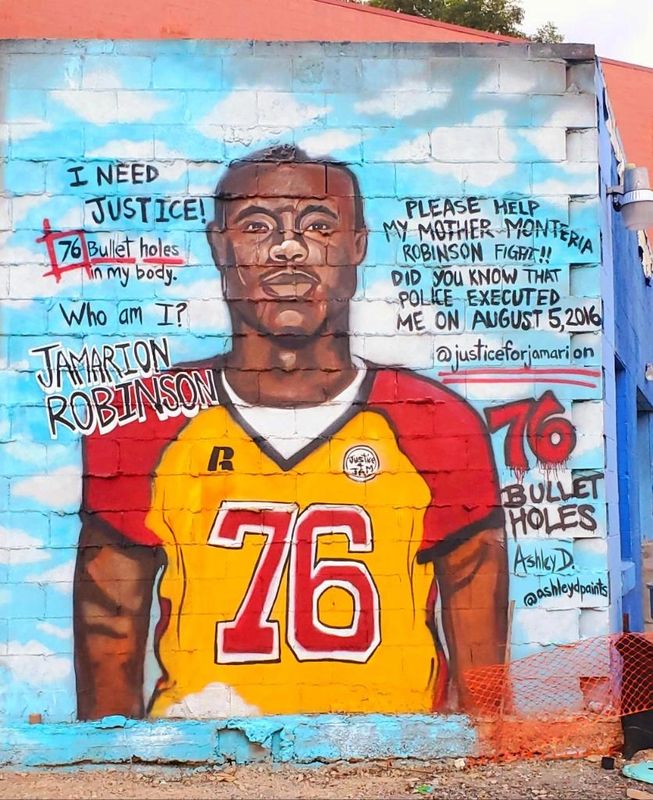
“He was being served a warrant at his girlfriend’s East Point home for an altercation with police during which they say he pulled a gun on them. A second warrant involved an incident in my home when I called the police because he was pouring gasoline throughout the house,” she said. “You can’t just approach a person that suffers from schizophrenia, paranoia. And they knew that my son suffered from schizophrenia, paranoia. I called the police for help. They filed a warrant.
“My son was murdered, and it’s like, no one has been listening to me. If it had not been from my efforts, along with a lot of the grassroots organizations here in Atlanta, Ga., I don’t think we would have gotten here,” she said. “You know I had to be aggressive, pushing forward, every day trying to make my voice heard. And I was like: ‘They will say my son’s name.
They will see my son’s face on every corner that they turn.’ And I made that happen. I literally made that happen. Jamarion became a Muslim in May of 2016; he was a scholar-athlete while attending Clark Atlanta University, where he played football. He was set to finish his degree in biology at Tuskegee. Jamarion had no prior convictions, and he was not a criminal.”
‘The process hasn’t been finished yet’
Rashid McCall, who served as the lead investigator for the Robinson family, cautioned against getting overly excited about the indictments. “The process hasn’t been finished yet. And as we all know, police in this country are rarely held accountable for their actions; even when they’re found guilty, they don’t necessarily serve substantial time,” he said.
“So when we look at it from a historical perspective, I am hopeful that the trend will change. And if it doesn’t, we still have to continue striving for justice for our people because Jamarion is not the last person. He’s already one of many in the whole continuum of state violence against our people.”

In describing the climate in 2016 when police officers killed more than 250 Black men, Mr. McCall noted that communities across the country were up in arms every single week, dealing with death after death. “I feel like the police took exception to that, and it was almost like each day it got worse. It was almost like they were out there trying to outdo each other,” he said.
It is impossible for police agencies to investigate other police forces, even when done at the state level, he argued. Even a Black prosecutor in the Atlanta area complained and sued the federal government for stonewalling in the case and complained about the lack of body cam footage.
The prosecutor, however, backed away in the name of the Justice Dept. “acting in the spirit of the investigation.” It was another low point for those who couldn’t forget the number of bullets that were pumped into Jamarion’s body and who wanted justice.
Mr. McCall shared how police violated laws in dealing with Jamarion. It includes police, who were from several different jurisdictions, burglarizing Jamarion’s apartment, he said.
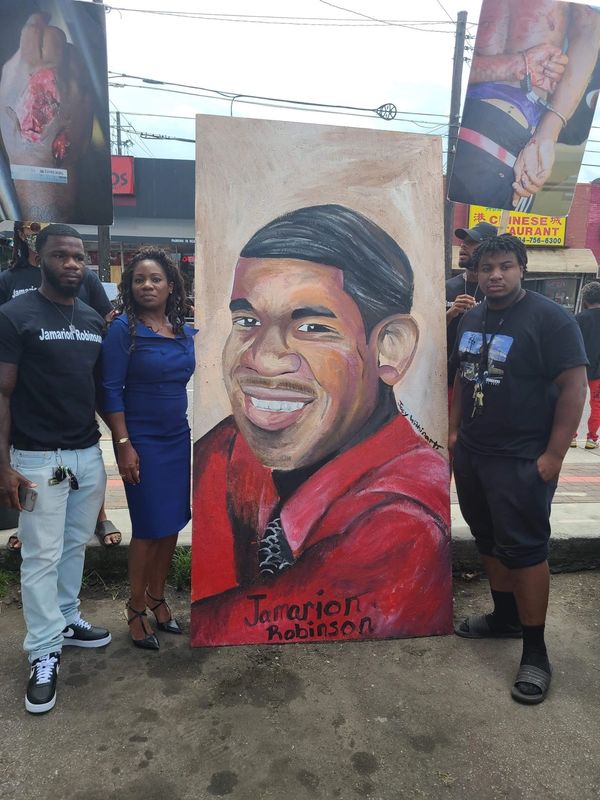
“It was burglary because they had this place under surveillance. They could have gone through the correct protocols in obtaining a warrant for a search for that particular property. And for them to lie, for them to make up excuses on why they could not do that is a travesty,” said Mr. McCall. “I think it’s important for us to reimagine what policing looks like in this day and age and take responsibility in terms of our community for our protection and safety. I think that that’s paramount because you won’t have bad actors coming into a community (where) they’re taking responsibility for their public safety.”
Marcus Coleman, an Atlanta-based community activist with a political, civil rights organization called Save OurSelves, stood with the Robinson family from the beginning. “We salute the new Fulton County District Attorney, Foni Willis, a sister who has made history as being the first Black woman, being the first woman to become district attorney. We applaud her for doing what falls under her job description.
It was 1,908 days that it took for this legal process to play out,” he said. But Mr. Coleman added, “I don’t make a habit of cheering in the locker room at halftime. I’ve had the honor and the opportunity of being involved with many indictments in the southeastern region and some across the nation, but even fewer convictions.”
“When there is a joint task force which involves federal agents, they do not have to be required to have body cameras, and that’s legislation that we need to look into. We also know today that in terms of mental health issues, not every call has to have an officer at the point, you know. There can be social workers, people that are trained and are experts in the area of mental health,” he said.
“I saw the results of the excessive force used that day. Where he lived was an older apartment complex. And man, it was filled with so many bullet holes. I think 110 rounds were fired, and the boy was hit 59 times and ended up with 76 exit wounds. But apart from his apartment, the neighboring apartments, I mean, bullets went whizzing in and out of the whole unit. So the excessive force was not just, of course, on the deceased. I mean everyone in that unit was in danger that day.”
Adding to the despicable deadly assault, a flash-bang grenade was used, according to Mr. Coleman. The family also charges Jamarion’s dead body was dragged down a flight of stairs where he was handcuffed—after he had been shot nearly 60 times. An independent investigation conducted by Opposition Research found that someone stood directly over his lifeless body and fired additional rounds into him. “One of the most chilling things about this case is somebody climbed up the stairs and stood over the boy and put one in him,” Mr. Coleman said.
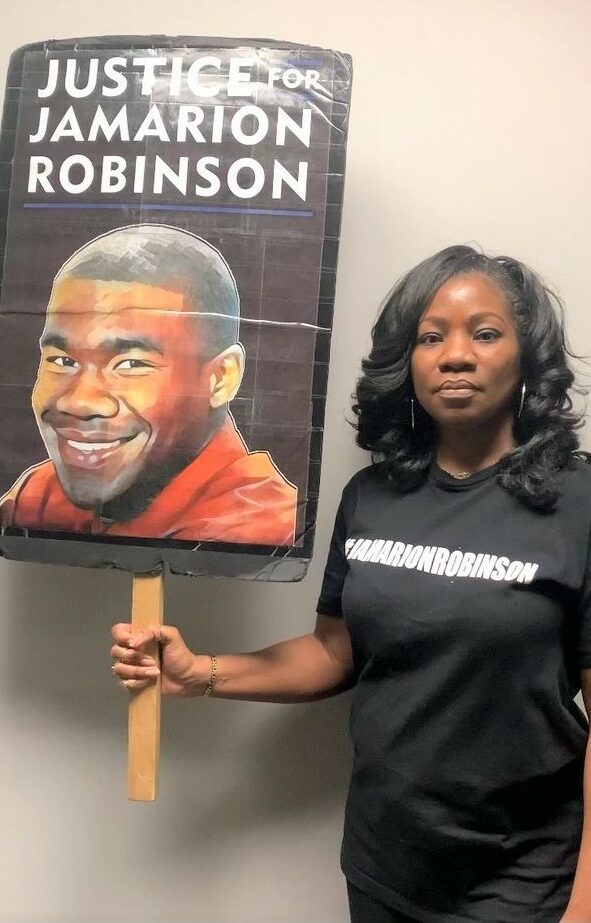
Questions about officer conduct, accountability and charges of Justice Department stonewalling
At Final Call presstime, though the charges had been filed, neither officer was in custody. The indictments were handed up Oct. 26 after the Fulton County district attorney’s office presented Jamarion’s case to a grand jury.
Mr. McCall of Atlanta-based Opposition Research Investigative and Protective Services compared Jamarion’s killing to the police assassination of Black Panther Chairmen Fred Hampton in 1969 in Chicago. Ninety rounds of ammunition were fired into his apartment. Jamarion was shot 59 times on August 16, 2016, he said. Officers involved in the Hampton case freely walked away when the killing was ruled a justifiable homicide.
Jamarion’s case opened up questions about police use of force, lack of transparency and accountability, lack of use of body cameras by police and U.S. Marshals when serving arrest warrants and interacting with people who suffer from mental illness.
A family lawsuit charged law enforcement officers used excessive force when they shot Jamarion and the officers tried to cover up their actions by tampering with evidence, lawyers for Jamarion’s mother asserted in a 2018 federal civil rights lawsuit.
Officers serving an arrest warrant broke down the front door of an apartment in East Point and “without cause or provocation” began “spraying” the inside of the apartment with bullets, killing Jamarion, lawyers for his mother wrote in the lawsuit. The officers were aware that Jamarion had been diagnosed with schizophrenia but failed to investigate his mental health status before trying to arrest him and weren’t properly trained to arrest people with psychiatric conditions, the lawsuit said.
The Georgia Bureau of Investigation said in a news release the day after the shooting that gunfire erupted when members of a U.S. Marshals Service task force made contact with Jamarion inside the apartment. Witnesses and videos show that officers gave numerous verbal commands for Jamarion to put down a weapon, the GBI said.
GBI agents found a handgun and multiple spent rounds “believed to be associated with Robinson,” the release said. But when a Black prosecutor was demanding information from federal officials about the case, he declared that the gun was “inoperable.”

East Point police said after the killing that Jamarion was suspected of shooting at Atlanta officers about 10 days earlier. Andrew M. Stroth, a Chicago-based attorney representing Jamarion’s mother, said he didn’t believe Jamarion fired at officers, in a June 10, 2018, Associated Press article. He also said the narrative provided by police about Jamarion’s shooting is not consistent with witness accounts that he said he and others had gathered.
“We’re fighting to make sure the individual officers that made up the task force are held responsible for their unjustified and unconstitutional actions,” Mr. Stroth told the Associated Press. “In addition, we’re seeking reform of the policies and procedures of these departments. You’ve got a group of rogue officers unconstitutionally violating folks’ rights in Atlanta.”
The lawsuit said officers knocked loudly on the front door of the apartment multiple times and then broke the door down and began shooting without knowing how many people were inside.
At least one officer then went up to a second-floor landing, where Jamarion’s body lay and took steps to cover up the officers’ actions, including setting off a flash-bang grenade, firing two bullets into his body, handcuffing his body, putting an oxygen mask on his body and moving his body to the first floor. Those actions were taken to make it difficult or impossible to accurately reconstruct the shooting, the lawsuit said.
The lawsuit was filed against eight named law enforcement officers from a number of different law enforcement agencies, as well as 11 unidentified officers. It alleges that the officers violated Jamarion’s constitutional rights, using excessive force, manipulating evidence and falsifying reports.
The lawsuit sought “substantial actual or compensatory damages” for violations of state law and Jamarion’s constitutional rights, as well as punitive damages and attorney fees.
The family hadn’t gotten any information from law enforcement about what happened, and filing a federal lawsuit allows them to have subpoena power to get documents from law enforcement, Atty. Stroth said in 2018. “The family wants the truth,” he said. “Let’s find out the truth of what happened to Jamarion Robinson and let’s hold those officers accountable.”
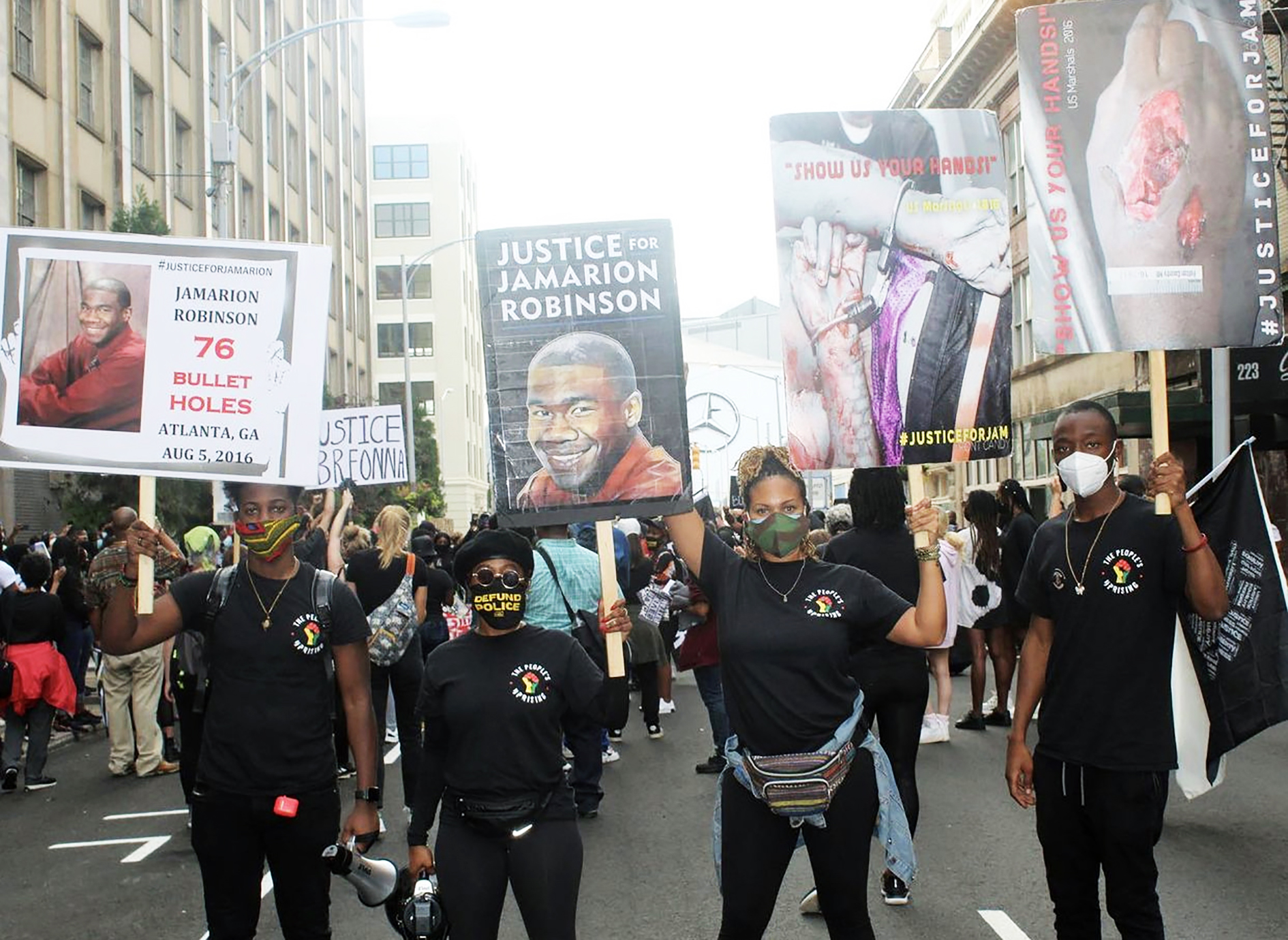
In December 2018, the U.S. Department of Justice was sued over its refusal to provide information about what happened that fateful day. Then-Fulton County District Attorney Paul Howard accused the federal authorities of blocking his prosecutors from interviewing the officers who killed Jamarion.
Mr. Howard said the federal agency also stymied his investigation of the 2016 killing by refusing to turn over any documents, despite numerous requests over two years under the federal Freedom of Information Act.
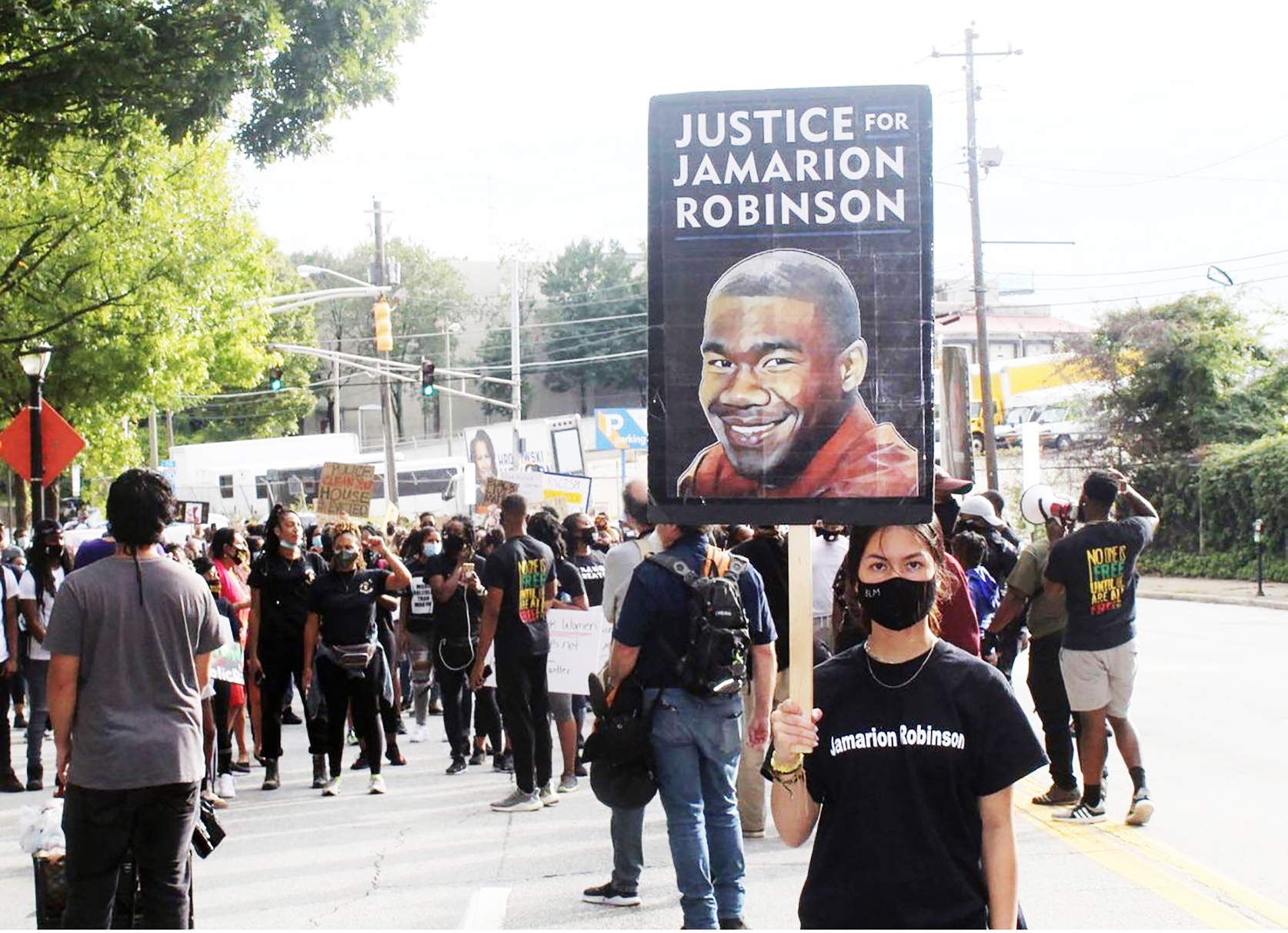
“We’ve never done anything like this,” he said of the lawsuit. “Our hope was that the federal authorities would cooperate and provide this office and this family with all the information about this incident. I cannot understand why they have not done it.” Jamarion’s mother accompanied Mr. Howard when he announced the lawsuit.
Atlanta criminal defense lawyer Page Pate, who isn’t involved in the case but has handled numerous others involving the federal government, said the standoff between local and federal law enforcers “is extraordinarily unusual.”
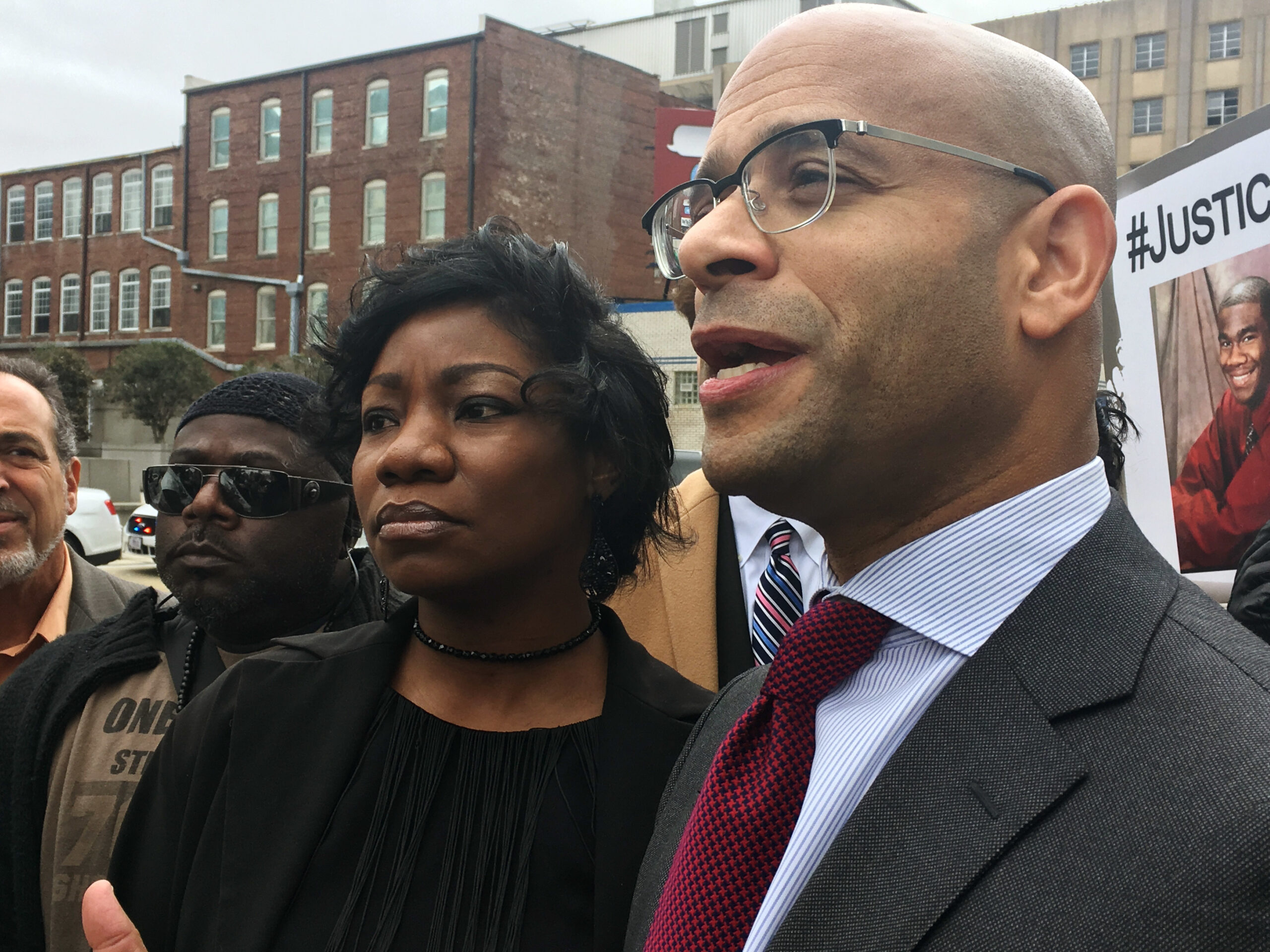
“They stonewall plaintiffs all the time, but it is unusual for them to stonewall a district attorney who is investigating a possible crime. … They generally cooperate when it comes to investigating serious crimes,” Atty. Pate told the Associated Press.
The fugitive task force was armed with weapons that included submachine guns, according to the lawsuit.
The lawsuit alleged federal officials didn’t even return calls to the prosecutor’s office. “It has now been 875 days since the officers killed Mr. Robinson, and the DOJ has yet to provide any of the documents or evidence requested and has failed to provide any investigative reports relating to Mr. Robinson’s death,” the 2018 lawsuit stated.
The lawsuit also alleges that while officers claimed Jamarion fired at them three times with a gun found later in his apartment, “when the firearm was recovered, it was damaged and inoperable.”
Yet Mr. Howard withdrew the federal subpoenas on January 31, 2019.
According to 11 Alive, Mr. Howard had “issued testimonial subpoenas to seven local law enforcement officers and a US Immigration and Customs Enforcement agent, to appear before the grand jury on Feb. 5. The Department of Justice accused Howard of trying to bypass the proper authorization process and filed a motion to quash the subpoenas.
Howard has again made his case to the D.O.J. why he feels the documents and interviews are necessary, but in a ‘spirit of cooperation’ has agreed to withdraw the subpoenas. He has asked the D.O.J. to respond with their intentions within the next 10 days.”
The then-district attorney, however, never received the information requested.
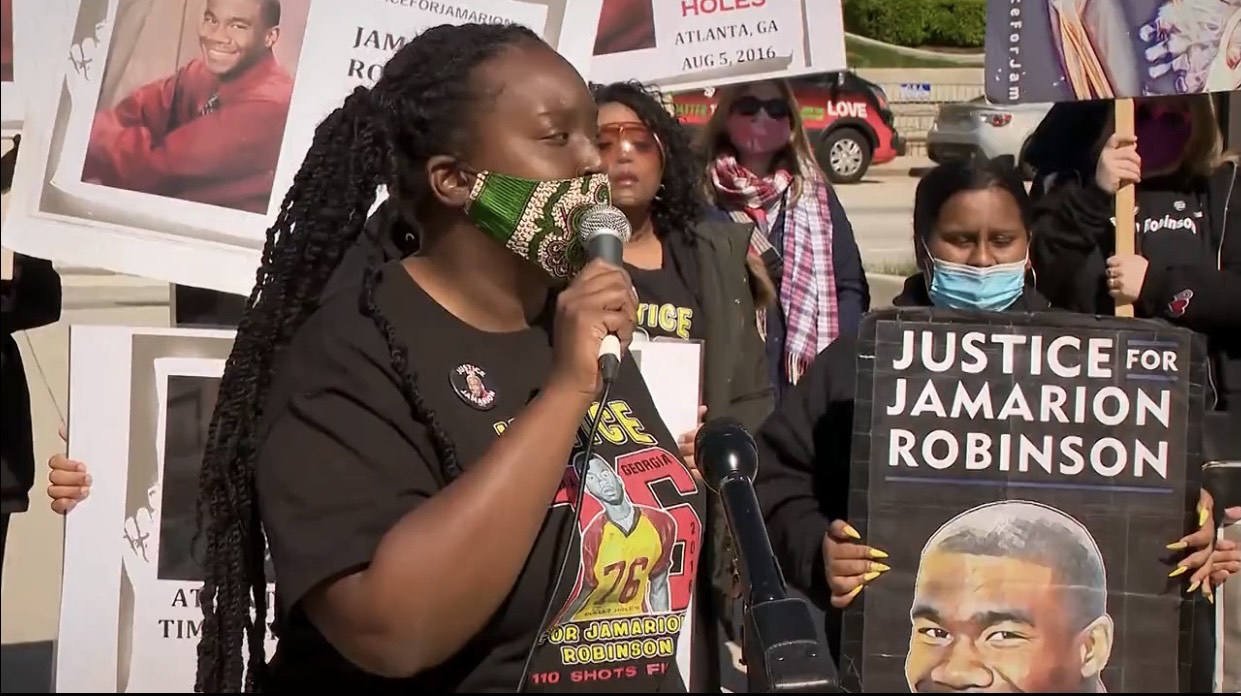
As a result Fulton County prosecutors filed another civil suit against the Justice Dept. in September seeking access to “all records” about the Southeast Regional Fugitive Task Force operations on 14 topics.
Prosecutors also say the Justice Dept. violated Freedom of Information Act laws.
Their request includes “all internal investigative documents and reports, as well as recorded interviews, either reviewed or prepared by the Department of Justice pertaining to [the Robinson shooting],” attorneys’ fees and litigation costs.
U.S. District Court Judge Timothy C. Batten, Sr. did not rule favorably in the wrongful death civil lawsuit in federal court. The Robinson family has appealed that ruling.
The Final Call reached out to the Department of Justice and the Southeast Regional Fugitive Task Force for comment but did not receive a response at press time. For more information or to support Ms. Robinson, visit www.justiceforjamarion.org.
The Associated Press contributed to this report.













